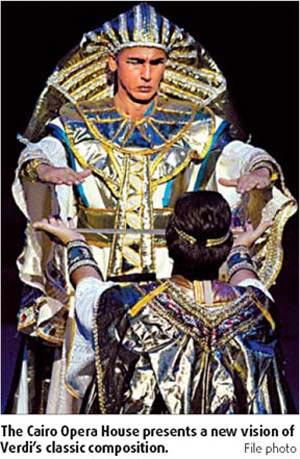Source: China Daily
07-08-2008 10:09
BEIJING, July 8 -- What could be more spectacular than a live performance of Verdi's masterpiece opera Aida in front of its spiritual home, the Giza Pyramids, just outside Cairo? But if you can't make it to Egypt, the Cairo Opera House is performing it at Beijing's National Center for the Performing Arts from July 10 to 13.
 |
| (Photo Source: China Daily) |
The Cairo Opera House will bring a huge cast and crew of more than 300 to Beijing, including the orchestra, chorus, ballet dancers and technicians along with the stage, accessories and decorations.
Stage engineer and setting designer Mahmoud Haggag visited the venue earlier this year and promised to present one of the most splendid productions of Aida.
There will be a 9-m-tall, 14-m-wide statue of Pharaoh, six huge stone pillars, a 20-m-long ship, the luxurious room of the Egyptian princess Amneris and the 5-m-tall war chariot commanded by the general Radames.
"The new National Center for the Performing Arts has the most advanced theater facilities which make many possibilities come true," says Haggag.
"The triumphal march composed of 500 performers and including 200 locals from Beijing will be one of the most lavish things you have ever seen. And the whole production will show a noticeable improvement in facilities over previous shows," says Haggag.
Cairo Opera House artistic director Abdel-Moneim Kameto is promising that this, his fourth Aida, will offer "a new vision" of the ballet.
The background to the conception of Aida is suitably noteworthy.
As part of the celebrations of the opening of the Suez Canal in November 1869, the Khedive of Egypt built a new opera house in Cairo and approached Verdi about the composition of an inaugural ode. The composer declined somewhat haughtily, saying he was "not accustomed to compose occasional pieces".
Six months later, however, Verdi finally consented to write an opera specifically for Cairo, on an Egyptian theme. Camille Du Locle, a close friend since the days they had collaborated on Don Carlos in Paris, had sent him a scenario based on a synopsis written by Auguste Mariette, a French Egyptologist in the service of the Khedive.
The premiere in Cairo was originally scheduled for January 1871 but the French had not long before declared war on Prussia and the plans were put on hold. The wait was worthy, though, and the premiere was a resounding success.
This four-act tragic working of the famous tale of star-crossed lovers - the triumphant Egyptian captain Radames and the captured Ethiopian slave-girl, Aida - stormed the operatic world and remains one of the best-loved operas of all time.
Aida features a perfect combination of musical invention and dramatic expression. It is also a work involving various personal relationships. Of these relationships, the rivalry between Aida, daughter of the King of Ethiopia, and Amneris, daughter of the King of Egypt, is intense. Both love Radames, victorious leader of the Egyptian army. He loves Aida but is given the hand of Amneris in reward for his exploits as army commander. But even more complex is the relationship of Aida with her father who arrives as an unrecognized prisoner.
Many and various complex possibilities of the father-daughter relationship occur throughout Verdi's operas, but nowhere more starkly than in this opera, where the father puts tremendous emotional pressure on his daughter to cajole her lover into betraying a state secret. This betrayal would cost the lives of the two lovers.
The cast includes sopranos Iman Moustafa and Julie Karagouni as Aida, tenors Angelo Simos and Mario Leonardi as Radames, baritone Moustafa Mohamed as Amonasro, and sopranos Hanan El Guindy and Eugenie Grunewald as Amneris.
Editor:Chen Ge
